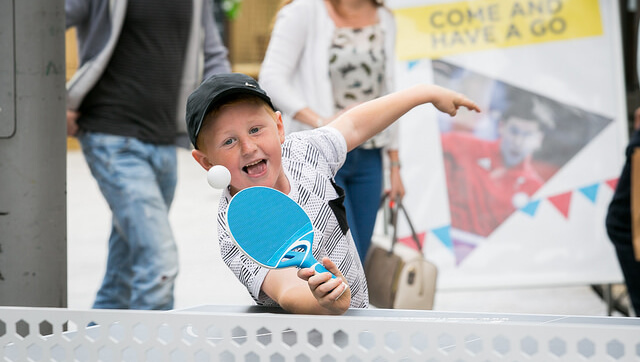KEY INFORMATION
Recommended age group: 7–11
Time required: one 45–60 minute session
Equipment: It's about ability not disability information sheet, Paralympic Champions assembly slides, Paralympic movement assembly slides (optional).
ACTIVITY IDEA
Use some or all of the introductory ideas below to help the children focus on issues and perceptions around disability and to gain background information about the Paralympic Movement and Paralympians.
- Identify and discuss the children's current attitudes and perceptions about disability. Play a quick round of Word Association – when you say the words 'disability', 'disabled' or 'Paralympic', for example, what are the first images and words that spring into their minds? List these on the board, or ask the children to make a quick sketch.
- Share the Paralympic champions assembly slides with the whole class and talk about the things the children themselves have done that they are proud of. What kinds of things have the disabled athletes and personalities achieved that would make us all proud? Have they learned anything from the slides that has surprised them or made them think differently about disabled people?
- Enjoy and discuss some of the highlights of National Paralympic Day 2014 by watching the video above with the whole class. How many different elite Paralympic sports did the children spot? Are there any they might like to try? Can they remember the names of any other Paralympians?
- Find out more about the development of the Paralympic Movement through the Paralympic Movement assembly or the British Paralympic Association website.
- Go through the information on the activity sheet with the whole class, making sure they understand the headings and vocabulary, e.g. 'impairment', 'achievement' and the name of the Paralympic sport.
- Give pairs or small groups one of the character profiles from the activity sheet, or let them choose a person of their own, and, depending on the age and ability of the children, either carry out further research through their character's website, or from the British Paralympic Association website pages, or practise reading the information from their profile 'card' in preparation for sharing the information with the rest of the class.
- You could create your own profiles about local disabled athletes or other disabled people that the children may know about and admire.
- Pairs or groups take turns to verbally 'introduce' and 'present' their disabled character in an interesting and engaging way to the rest of the class. They should include their thoughts on how their character reflects one or more of the Paralympic Values: equality, determination, courage and inspiration.
- Invite further discussion and feedback: what have they learned so far about National Paralympic Day, the development of the Paralympic Movement and the life stories and achievements of the characters they have found out about during their research and presentations? Were they surprised about anything? What excited or inspired them that they might like to develop into a story of their own?
Differentiation
- Older/more able children can carry out more of their own research about a disabled athlete or personality they know about, e.g. from TV or the Media, and make an extended verbal presentation, prior to preparing their own story in a genre of their choice.
- Younger/less able children will rely more heavily on the information provided on the activity sheet.
Extension
- Post some character profiles up on the school website to help raise awareness and challenge people to examine their perceptions and attitudes towards disability.
- Use the Power of storytelling resources to share ideas about how they could become citizen journalists by using some or all of the information they have discovered to create a story that might excite or challenge others.
- Discuss and list the different ways we can tell stories: newspaper/magazine/website stories, fiction (e.g. an adventure story), a picture and caption story or a short film, for example. Which ones would the children like to try in the next lesson?
- Discuss and identify who else might like to share the children's stories – beginning with showcasing them on the Get Set website for the chance to win Get Set goodies.

